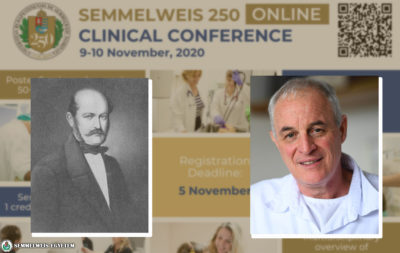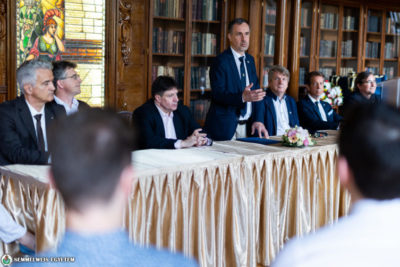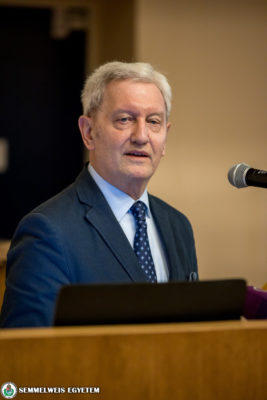 “Semmelweis University, which is celebrating its 250th anniversary, is one of our longest established higher education institutions, holds a promising place in international rankings, and its contribution to Hungary’s reputation around the world in undeniable,” said Dr. József Bódis, state secretary responsible for higher education, innovation and vocational education at the Ministry of Innovation and Technology, in his opening speech. He noted that the government supports the development of Hungarian medical education and the goal of becoming one of the key centers within the European Union for the training of medical and health care professionals in the future. Hungarian medical universities will also have to improve their competitiveness, expand training and research capacities, and increase their funding. With these steps, not only the needs of Hungarian health care professionals can be satisfied but also thousands of foreign students can be attracted to Hungarian universities, he said. The state secretary noted that Hungarian companies have achieved outstanding results within the health care industry, but medicine and other related sciences are evolving so fast that the training of doctors must be defined accordingly, with increased efficiency and effectiveness and emphasis on innovation. and our knowledge is growing exponentially. “We learned from Ignác Semmelweis that the social utility of prevention can become a serious competitive advantage for our nation, and the current pandemic teaches us how important prevention is and shows that the mutual responsibility of communities and individuals are inevitable,” said Dr. Bódis.
“Semmelweis University, which is celebrating its 250th anniversary, is one of our longest established higher education institutions, holds a promising place in international rankings, and its contribution to Hungary’s reputation around the world in undeniable,” said Dr. József Bódis, state secretary responsible for higher education, innovation and vocational education at the Ministry of Innovation and Technology, in his opening speech. He noted that the government supports the development of Hungarian medical education and the goal of becoming one of the key centers within the European Union for the training of medical and health care professionals in the future. Hungarian medical universities will also have to improve their competitiveness, expand training and research capacities, and increase their funding. With these steps, not only the needs of Hungarian health care professionals can be satisfied but also thousands of foreign students can be attracted to Hungarian universities, he said. The state secretary noted that Hungarian companies have achieved outstanding results within the health care industry, but medicine and other related sciences are evolving so fast that the training of doctors must be defined accordingly, with increased efficiency and effectiveness and emphasis on innovation. and our knowledge is growing exponentially. “We learned from Ignác Semmelweis that the social utility of prevention can become a serious competitive advantage for our nation, and the current pandemic teaches us how important prevention is and shows that the mutual responsibility of communities and individuals are inevitable,” said Dr. Bódis.
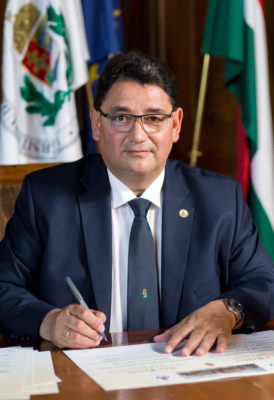 In his introductory remarks, rector Dr. Béla Merkely said that the Clinical Conference is a special event of its 250-year anniversary event series, and the first international event showcasing the clinical activity of Semmelweis University in its complexity, and providing a multidisciplinary overview of innovations and developments in different fields of clinical medicine, presented by around 80 renowned national and international speakers. He greeted the 1,500 participants who registered for event that is held online after having been postponed in the spring due to the coronavirus. “Although the epidemic has changed life for all of us significantly, it also drives new innovation in the field of clinical medicine,” said the rector. He recalled that the university has always played an important role in defeating crises throughout history, and is leading the fight against Covid as well today, being the largest health care provider in Hungary in treating coronavirus patients, and also being a leader in innovation and research regarding the virus. He emphasized the importance of practice-orientation at Semmelweis University, which is even more enhanced by the curriculum reform introduced last year. Dr. Merkely said the conference will present the clinical activity of Semmelweis University in its complexity; it will not focus on one field of medicine, but it will provide a multidisciplinary overview of the broad spectrum and high quality of patient care, clinical and translational research as well as its extensive international relations and collaborations. He expressed his hope that despite the online firm, the two-day conference will present a good opportunity for discussion and to learn from each other.
In his introductory remarks, rector Dr. Béla Merkely said that the Clinical Conference is a special event of its 250-year anniversary event series, and the first international event showcasing the clinical activity of Semmelweis University in its complexity, and providing a multidisciplinary overview of innovations and developments in different fields of clinical medicine, presented by around 80 renowned national and international speakers. He greeted the 1,500 participants who registered for event that is held online after having been postponed in the spring due to the coronavirus. “Although the epidemic has changed life for all of us significantly, it also drives new innovation in the field of clinical medicine,” said the rector. He recalled that the university has always played an important role in defeating crises throughout history, and is leading the fight against Covid as well today, being the largest health care provider in Hungary in treating coronavirus patients, and also being a leader in innovation and research regarding the virus. He emphasized the importance of practice-orientation at Semmelweis University, which is even more enhanced by the curriculum reform introduced last year. Dr. Merkely said the conference will present the clinical activity of Semmelweis University in its complexity; it will not focus on one field of medicine, but it will provide a multidisciplinary overview of the broad spectrum and high quality of patient care, clinical and translational research as well as its extensive international relations and collaborations. He expressed his hope that despite the online firm, the two-day conference will present a good opportunity for discussion and to learn from each other.
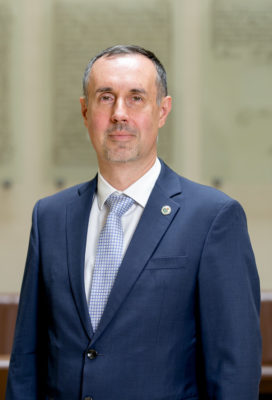 “We live in a rapidly changing world, where knowledge is most powerful dominance; the new equation of the 21st century is knowledge plus information equals power,” said Dr. Attila Szabó, Vice-Rector for Clinical Affairs and the president of the Clinical Center, the event’s organizer. This means that the only possible way to overcome challenges is by creating knowledge, and not only improving competitiveness among nations and regions. We have to use basic, clinical and translational research to improve the quality of life and health of people all over the world, he added, urging participants at the conference to use their knowledge to understand life, with the support of science.
“We live in a rapidly changing world, where knowledge is most powerful dominance; the new equation of the 21st century is knowledge plus information equals power,” said Dr. Attila Szabó, Vice-Rector for Clinical Affairs and the president of the Clinical Center, the event’s organizer. This means that the only possible way to overcome challenges is by creating knowledge, and not only improving competitiveness among nations and regions. We have to use basic, clinical and translational research to improve the quality of life and health of people all over the world, he added, urging participants at the conference to use their knowledge to understand life, with the support of science.
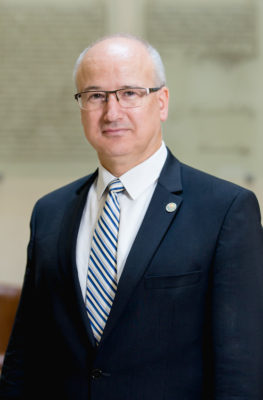 In his keynote presentation, Dr. Miklós Kellermayer, the dean of the Faculty of Medicine, spoke about the relationship between the new curriculum and COVID-19. After summarizing the details and the objectives of the new curriculum introduced last year, he noted that all this was put to the test during the coronavirus epidemic, but the university was able to adapt to the circumstances, among others with a quick transition to online instruction. “We placed great emphasis on feedback from students and created many online audiovisual materials,” said the dean. In the second part of his lecture, Dr. Kellermayer summarized the coronavirus-related research efforts of the university and his research group specifically, which sought to understand the properties of the novel coronavirus. “SARS-CoV-2 is mechanically resilient, but our medical curriculum is also resilient, owing to the resourcefulness of our faculty and the enthusiasm of our students,” he pointed out.
In his keynote presentation, Dr. Miklós Kellermayer, the dean of the Faculty of Medicine, spoke about the relationship between the new curriculum and COVID-19. After summarizing the details and the objectives of the new curriculum introduced last year, he noted that all this was put to the test during the coronavirus epidemic, but the university was able to adapt to the circumstances, among others with a quick transition to online instruction. “We placed great emphasis on feedback from students and created many online audiovisual materials,” said the dean. In the second part of his lecture, Dr. Kellermayer summarized the coronavirus-related research efforts of the university and his research group specifically, which sought to understand the properties of the novel coronavirus. “SARS-CoV-2 is mechanically resilient, but our medical curriculum is also resilient, owing to the resourcefulness of our faculty and the enthusiasm of our students,” he pointed out.
The Semmelweis 250 Clinical Conference will also include a poster session where participants can learn about the results of some 60 research projects. The two-day event will feature more than 20 fields of medicine represented by 80 speakers, including 20 international experts, while conference sessions will include cardiology, surgery, pediatrics, emergency medicine, internal medicine and many other fields. The English-language event is open to all Semmelweis staff and students, as well as workers and faculty of all Hungarian medical institutions and universities, with students receiving 1 credit point for participation in the international professional program.
Tamás Deme
Photos (archive): Attila Kovács – Semmelweis University
